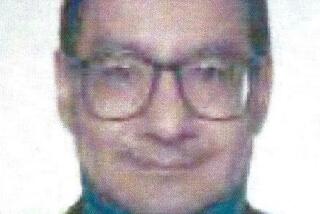Clair E. George dies at 81; spy was pardoned for Iran-Contra lies
Clair E. George, a former CIA covert operations chief who received a presidential pardon in 1992 after being convicted of two counts of lying to Congress in connection with the Iran-Contra scandal during the Reagan administration, has died. He was 81.
George, a 32-year veteran of the CIA who lived in Chevy Chase, Md., died of cardiac arrest Aug. 11 at Suburban Hospital in Bethesda, Md., said his daughter Leslie George.
George’s career in espionage took him to agency stations around the globe and culminated with his becoming the CIA’s third-highest-ranking official. As deputy director for operations, he was responsible for covert operations worldwide from 1984 to 1987.
During that time, an investigation was launched after disclosures in late 1986 that profits from secret U.S. arms sales to Iran in an attempt to free U.S. hostages in Lebanon had been diverted to support Contra rebels in Nicaragua at a time when Congress had barred military aid to the rebels.
In 1991, the retired George was indicted on 10 felony counts of perjury, giving false statements and obstruction in his 1986 testimony to congressional panels and a federal grand jury investigating Iran-Contra. He pleaded not guilty.
The indictment reportedly relied greatly on a statement to prosecutors from Alan D. Fiers Jr., the former head of the CIA’s Central America task force, in which he said George directed him in October 1986 not to disclose his knowledge of a secret arms pipeline to the Nicaraguan rebels. The secret supply network was being run by National Security Council aide Lt. Col. Oliver L. North.
The 1992 prosecution of George ended in a mistrial that August. A retrial began that October. In December, he was found guilty of two counts of lying to Congress, which made him the first high-ranking CIA official ever convicted of felony offenses while carrying out official duties.
Independent counsel Lawrence E. Walsh, who had taken heat for continuing his investigation of Iran-Contra for six years, called the verdict “a significant victory.”
“It will be an important deterrent to protect the Congress and the public from cover-ups by high-level national security officials,” Walsh said in a statement.
George faced a maximum penalty of five years in prison and $250,000 in fines on each count and was scheduled to be sentenced on Feb. 18.
But on Christmas Eve 1992, outgoing President George H.W. Bush pardoned George — as well as former Defense Secretary Caspar W. Weinberger, former Reagan national security advisor Robert C. McFarlane and three other Iran-Contra figures.
While her father was awaiting sentencing, Leslie George said, “I remember having family meals talking about if Dad went to jail, where he would go and how we would visit him. It was pretty scary stuff. It was right before Christmas when he was pardoned, and it was a big load off our shoulders.
“It was a gift that President Bush gave us. We were so happy.”
After retiring from the CIA in 1987, George was a private consultant for various individuals and companies, including Feld Entertainment, whose holdings include the Ringling Brothers and Barnum & Bailey Circus.
But his days as a spy were not over.
As reported by Salon.com in 2001, George stated in an affidavit for a lawsuit filed by a former top executive against Ken Feld that part of his work for Feld Entertainment included obtaining information on a writer — and conducting other activities — in an effort to thwart her from writing an unauthorized biography of Feld and his family.
Born in Pittsburgh on Aug. 3, 1930, George grew up in Uniontown and Beaver Falls, Pa. After earning a degree in political science from Pennsylvania State University in 1952, he joined the Army and served a year with the counterintelligence corps in East Asia.
After joining the CIA in 1955, he was stationed in Hong Kong, Paris, Mali and India. He was stationed in Beirut in 1975 at the start of the Lebanese civil war and later volunteered to replace the station chief in Athens, who had been assassinated.
A 1991 Times article on George said colleagues described him variously as “brilliant, witty, vain, impatient and — above all — brave.”
He was, The Times reported, “the consummate spy, an engaging man who was just as familiar with the back alleys of Beirut as with the corridors of power in Washington.”
George’s wife, Mary, a former CIA secretary whom he married in 1960, died in 2008.
In addition to his daughter Leslie, he is survived by another daughter, Ann Davies; his sister, Gail Marshall; and three grandchildren.
More to Read
Start your day right
Sign up for Essential California for news, features and recommendations from the L.A. Times and beyond in your inbox six days a week.
You may occasionally receive promotional content from the Los Angeles Times.




















































